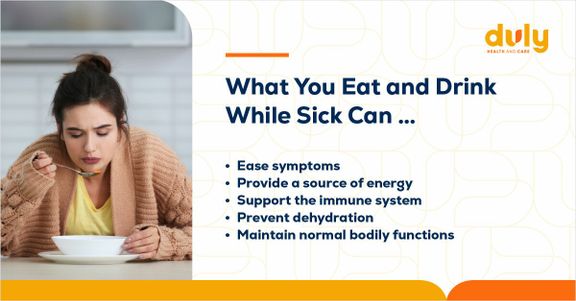By this time of year, you or someone you know has probably been hit by at least one winter illness, which can take many forms. The common cold, the flu, RSV, pneumonia, strep throat, COVID and norovirus (the stomach bug) are just a few.
During any time of year when you’re sick, nutrition and hydration are keys to easing discomfort and keeping you on the road to recovery.

Unfortunately, staying nourished and hydrated can be tough when you’re feeling under the weather. Here are 5 foods to eat while you’re sick that are easier on your body and can help you heal.
1. Feeling generally sick? Try soup, especially those that are broth-based.
Soup is many people’s go-to for any kind of illness, from colds to the flu to feeling generally unwell. Whether you opt for chicken noodle soup (protein and iron from the chicken are immune system boosters), pastina (the steam from the broth can combat congestion), arroz caldo (the high ginger content can help soothe a sore throat), or something else, soup is a great way to nourish your body while fighting illness.
Soup — particularly those that are broth-based — gives you much-needed liquid for hydration. Meanwhile, it has calories and nutrients that can help you recover. When it’s served hot, soup can also help soothe a sore throat.
2. Dealing with diarrhea? Opt for bland foods.
An upset gut can make it hard to get any nutrition in. But your body still needs fuel to fight illness. To help keep your food from moving too quickly through your digestive system (also known as diarrhea), stick with bland foods that have soluble fiber to slow down the process.
Ideal foods to combat diarrhea include bread, crackers, dry cereal, baked potatoes, pasta, and rice porridge. Some people like to adhere to the BRAT diet (bananas, rice, applesauce, and toast) to make it easier to remember what will be easy on the stomach. If you’re feeling up to it, include some protein by adding baked chicken to the rice.
Also, it is helpful to drink or sip Pedialyte or flat 7up with crackers for electrolyte replenishment. Good old Pepto-Bismol can help with the symptomatic treatment of abdominal cramps, nausea, vomiting and diarrhea. Avoid milk products (cheese or ice cream) and junk food.
3. Navigating nausea? Incorporate some ginger.
If you’re dealing with nausea or vomiting, the last thing you probably want to do is eat. To keep your body nourished, start by trying to eat every few hours as opposed to full meals that might send you over the edge. Also, be sure to sip liquids, do not drink an entire glass at once.
Similar to diarrhea, nausea can be combated with bland foods, like pretzels, toast, and crackers. But you may also want to add some spice — particularly ginger. Ginger has anti-nausea effects, including in products like ginger snaps, ginger ale, and ginger tea (be sure to make sure they contain real ginger). You can also boil fresh ginger for another version of ginger tea. Ginger candy is another option that can be easy to stomach while also soothing your symptoms.
4. Battling a sore throat? Use honey or salt water.
A scratchy, tickling, or painful throat might automatically make you reach for the medicine cabinet. But there are also a few approaches to ease your discomfort through food.
Honey can soothe both a sore throat and a cough. It can address inflammation, irritation, and even mucus build-up. How you ingest the honey is up to you. You can eat a spoonful on its own or stir some into warm water or tea. (Note that children under 1 year old should not eat honey due to the risk of infant botulism.)
Gargling with warm salt water can also ease sore throat symptoms. Mix about ½ teaspoon of table salt with 8 ounces of warm water. Gargle the solution, then spit it out. Keep in mind — this approach should only be used for children over 6 years old and adults to avoid swallowing the solution.
If your sore throat won’t subside, make an appointment with your Duly primary care provider to find out what’s causing your pain.
5. Worried about dehydration? Pair fluids with fruit or liquid-based food.
Fluids are a key component in preventing dehydration and recovering from illness. One of the primary reasons people go to the emergency room when they’re ill is due to dehydration. Without treatment, it can lead to serious complications, like kidney problems, seizures, and death.
Water is a great way to provide your body with hydration. But if water isn’t appealing and you’re concerned about dehydration, try sipping drinks with electrolytes, Pedialyte, sports drinks, flat 7up, tea, or juice throughout the day.
You can also increase your fluid intake through food. Fruit and vegetables, such as melons, grapes, berries, oranges, and cucumbers, all contain plenty of water. Other liquid-based foods that can help you hydrate include popsicles, ice cream, and pudding.
Prioritizing Nutrition While Sick
When you’re unwell, you might want to curl up under a blanket and ignore the world for a while. While that’s okay to do as you heal, it’s also important to make sure you stay nourished and hydrated as your body fights off your illness.
By focusing on foods and beverages that help you heal and are appealing while you’re sick, you can ensure your body has the energy and nutrients it needs to recover. Once you’re feeling well again, you can re-enter the world refreshed and ready to explore the vast options of food once again.
Health Topics:








